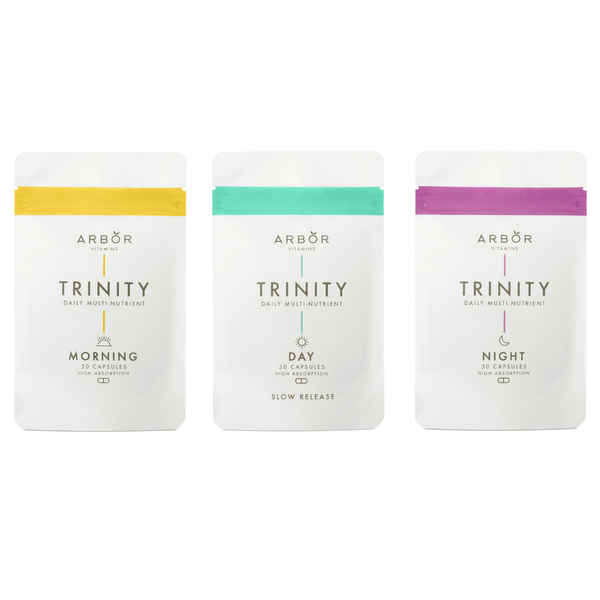In today's digital age, it's easier to spread awareness about important aspects of life, like your health. Besides eating right and exercising, taking supplements has become more and more necessary in this modern world. But when should you take them? What time fits best into your daily routine for your supplements?
In today's health-conscious environment, many people use supplements to cover nutritional deficiencies or support particular health objectives. However, learning how to determine when to take a supplement can be a difficult.
To help you out, Arbor Vitamins offers this complete guide. Keep reading to learn about the key factors that can help you decide the best time, proper methods, and important considerations to get the most out of our food supplements.
Buy our optimised nutrition supplements here - TRINITY Formulas
What is the Proper Way to Take Supplements?
The absorption of micronutrient pills is increased with meals. They are suitable for breakfast, lunch, and dinner. Try not to take them on an empty stomach as this might contribute to gut issues. Fat-dissolvable nutrients (vitamins A, D, E, and K) are better retained when combined with fat in meals.
Furthermore, avoid tea, coffee, other caffeinated beverages, bubbly fluids, and sports (or caffeinated) drinks for two or three hours when you take a supplement because caffeine can interfere with the absorption of certain nutrients. For example, caffeine can inhibit the absorption of iron and calcium, which are essential minerals for various bodily functions. By avoiding caffeine, you can ensure that your body effectively absorbs the nutrients from the supplements you're taking, maximising their benefits.
How Do You Know If a Supplement is Right for You?
One of the most important stages in considering supplement use is to talk with a knowledgeable healthcare expert. A healthcare professional evaluates your specific needs based on age, gender, medical history, and lifestyle. They can also recommend particular vitamins and doses based on your body's needs.
Buy TRINITY Formulas here.
Recognise Your Nutritional Needs
Before adding supplements to your life, assessing your current nourishing status is a must. A balanced eating regimen rich in whole grains, lean meat, natural dairy, vegetables, fruits, and healthy fats offers the nutritious components that your body demands.
However, health problems, dietary limitations, and lifestyle choices can affect how well you function. Further, the different types of fertilisers used in modern day agricultural practices may also reduce the quality of food and it's nutritious value.
How Do You Measure Your Dietary Intake?
Begin by assessing your daily eating habits. A meal journal can help you track your daily nutritional consumption. Look for deficiencies that might suggest the need for supplementation.
For instance, if you consume insufficient calcium-rich meals and dairy products, a calcium supplement may be useful.
How to Understand Supplement Labels?
While picking supplements, knowing how to read their labels is essential. Focus on the ingredient list to guarantee that the package carries the supplements with appropriate dosages, or made by a reputable person (a healthcare professional or nutritionist).
Consider and Modify Lifestyle Factors
Lifestyle factors such as exercise, stress, and environmental exposure can all influence your nutritional demands.
Athletes and other people who are active might require more supplements to help with energy age, muscle fixation, and immunological capability.
Evaluate Specific Health Goals
The consumption of appropriate supplements helps you achieve your health objectives and help certain health issues. Our TRINITY formulas are packed with vitamins, in 3 seperate formulas to maximise absorption and avoid nutrients interacting and becoming less effective in the body. They are also optimised to the times of the day you need the nutrients the most, for example our morning formula contains B vitamins for morning energy, and our night formula contains magnesium and zinc to promote restful sleep.
A well-balanced diet, regular exercise, and other healthy habits should all be part of a comprehensive wellness plan that includes supplements.
Timing and Dose
Deciding when to take supplements might be just as crucial as learning how to determine when to take a supplement. Some vitamins work best when taken with food.
Moreover, timing can influence how dietary pills interface with drugs and different supplements. Continuously comply with the suggested portion rules prompted by your medical care doctor or supplement producer.
Monitoring and Adjustments
You must evaluate the effects of adding supplements to your diet and make any necessary adjustments. Keep record of any change in your health, energy, or symptoms that might indicate something needs change.
Follow-ups with your medical services doctor can help guarantee that your supplemental routine is reasonable and effective.
Click here to read about what vitamins are good to boost immune system.
The Bottom Line
Understanding when to take a supplement requires considering several factors, like your diet, eating habits, lifestyle, and health goals. Consulting with our medical experts and adopting a proactive approach to your well-being can help you make informed decisions about supplements and improve your overall health. Remember, supplements work best when used alongside a healthy diet and lifestyle.












